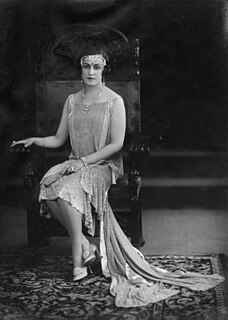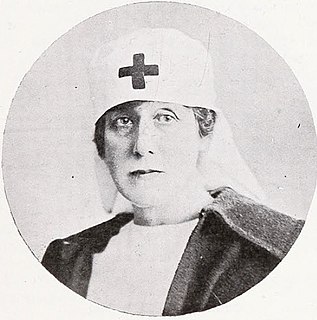
The Sección Femenina was the women's branch of the Falange political movement in Spain. Founded in July 1934 as part of the Sindicato Español Universitario (SEU) of the Falange Española de las JONS, and fully incorporated to FE de las JONS later in the year, it remained as part of the FET y de las JONS following the 1937 Unification Decree, subsequently becoming an official institution of the single-party of the Francoist dictatorship. Following General Franco's death and the beginning of the transition to democracy it was disbanded on 1 April 1977 together with all Movimiento Nacional institutions. Sección Femenina was led throughout its history by Pilar Primo de Rivera, the younger sister of Falange Española founder José Antonio Primo de Rivera.
Feminism in Argentina is a set of movements aimed at defining, establishing, and defending equal political, economic, and social rights and equal opportunities for women in Argentina. Although some women have been considered precursors—among them Juana Manso and Juana Manuela Gorriti—feminism was introduced to the country as a result of the great European immigration wave that took place in the late 19th and early 20th century. The first feminists did not form a unified movement, but included anarchist and socialist activists, who incorporated women's issues into their revolutionary program, and prestigious freethinker women, who initially fought for access to higher education and, later, legal equality with men. The early 20th century was also full of women fighting for their freedom and rights in the workplace. Despite the efforts of the first-wave feminists, Argentine women did not acquire the right to vote until 1947, during Juan Perón's first government. His highly popular wife, Eva, championed women's suffrage and founded and ran the nation's first large-scale female political party, the Female Peronist Party. Although she refused to identify herself as a feminist, Eva Perón is valued for having redefined the role of women in politics.

Ximena Bedregal Sáez is a Chilean-Bolivian architect, writer, theoretician, professor, editor, photographer, and feminist lesbian. In Mexico, she founded Centro de Investigación, Capacitación y Apoyo a la Mujer, and edited its magazine, La Correa Feminista.

Marta Vergara Varas was a Chilean author, editor, journalist and women's rights activist. Introduced to international feminism in 1930, she became instrumental in the development of the Inter-American Commission of Women (CIM) helping gather documentation on laws which effected women's nationality. She pushed Doris Stevens to broaden the scope of international feminism to include working women's issues in the quest for equality. A founding member of the Pro-Emancipation Movement of Chilean Women, she was editor of its monthly bulletin La Mujer Nueva. When she was ousted from the Communist Party she moved to Europe and worked as a journalist during the war. At war's end, she returned to Washington, D.C. and worked at the CIM continuing to press for women's suffrage and equality, before returning to Chile, where she resumed her writing career.

Celia Amorós Puente is a Spanish philosopher, essayist and supporter of feminist theory. She is a key figure in the so-called equality feminism and focused an important part of her research in the building of relations between Enlightenment and feminism. Her book Hacia una crítica de la razón patriarcal constitutes a new outlook on the gender perspective of philosophy, revealing the biases of androcentrism and claims a critical review on behalf of women.
Magaly Antonia Pineda Tejada, known as the mother of feminism in the Dominican Republic, was a Dominican sociologist, teacher, researcher, and activist. She was considered one of the most important defenders of human rights, particularly women's rights, in her country. As a leftist activist, she participated in the 14th of June Revolutionary Movement and the Dominican Popular Movement.
Consuelo González Ramos was a Spanish journalist, nurse, and feminist.

María Laffitte y Pérez del Pulgar, Countess of Campo Alange was a Spanish aristocrat, writer, art critic, women's rights activist, and founder of the Seminar on Women's Sociological Studies.
Elena Catena López was a Spanish university professor, philologist, publisher, and feminist. She was one of the first women to obtain a doctorate in Philosophy and Literature at the Complutense University of Madrid, and the first to reach the position of vice dean of that same faculty. In 1960 she co-founded the Seminar on Women's Sociological Studies.

Sofía Eastman Cox, also known as Sofía Eastman de Huneeus, was a Chilean feminist writer and socialite. In 1915, she was a founder and president of the Ladies' Reading Circle, one of the first women's groups in Chile, dedicated "to promote and cultivate letters and the arts from the point of view of reception and production, and to improve the quality of education received by women." She also held the presidency of the Chilean Women's Red Cross from 1918 to 1921, an institution of which she was also one of the main benefactors and managers.

Mary Josephine Nash Baldwin is an Irish historian living in Catalonia. She has specialized in the study of the history of women and feminism in Spain.

Ana de Miguel Álvarez is a Spanish philosopher and feminist. Since 2005 she has been a titular professor of Moral and Political Philosophy at King Juan Carlos University of Madrid. She directs the course History of Feminist Theory at the Complutense University of Madrid's Instituto de Investigaciones Feministas.
Women rights in Francoist Spain (1939–1975) and the democratic transition (1975–1985) were limited. The Franco regime immediately implemented draconian measures that legally incapacitated women, making them dependents of their husbands, fathers or the state. Moderate reforms would not begin until the 1960s, with more dramatic reforms taking place after Franco's death in 1975 and the ensuing democratic transition.
Feminism in Francoist Spain and the democratic transition period took place in a specific socio-historical context. Spanish feminism went through several waves in the Francoist period. Broadly speaking, they are first-wave feminism taking place from the mid-nineteenth century to 1965, second-wave feminism taking place from 1965 to 1975, and third-wave feminism taking place from 1975 to 2012.

Rosa Cobo Bedía is a Spanish feminist, writer, and professor of sociology of gender at the University of A Coruña. She is also the director of the Center for Gender Studies and Feminists at the same university. Her main line of research is feminist theory and the sociology of gender.

Lidia Falcón O'Neill is a Spanish politician and writer. With a degree in law, dramatic art, and journalism, and a PhD in philosophy, she has stood out for her defense of feminism in Spain, especially during the Transition.

Alicia Miyares Fernández is a Spanish philosopher, feminist, researcher, and women's rights activists. She has served as the spokesperson for several feminist organizations including anti-womb renting No Somos Vasijas and Recav. She has been involved with the efforts to keep abortion legal, writing the manifesto for the 2014 Tren de la Libertad. Miyares Fernández was active in advocating feminist causes ahead of the 2019 Spanish general elections.

María Espinosa de los Monteros y Díaz de Santiago, also María Espinosa Diaz, (1875–1946) was a Spanish women's rights activist and business executive. She is remembered in particular for founding in 1918 the Asociación Nacional de Mujeres Españolas which she headed until 1924. In 1898, she established the Spanish branch of the American Yost Typewriter Company, Casa Yost, which she headed until 1921. In 1926, she was appointed to serve as a councillor for the Municipality of Segovia.
Concepción Blasco Oliver was a Spanish philanthropist, linked to the Asociación Castellonense de Caridad, the Junta de Tráfico de Blancas, and the Obra de Protección de Intereses Católicos.
Florence Thomas is a French-Colombian social psychologist and feminist academic. She was a co-founder of the Programa de Estudios de Género, Mujer y Desarrollo at the National University of Colombia. She is also a journalist for the newspaper El Tiempo. Thomas was honored with the Premio Nacional de Periodismo Simón Bolívar in 2005. In 2017, Thomas was decorated as a Knight in France's Legion of Honour.











